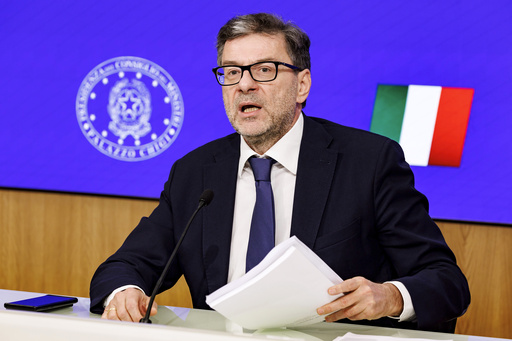
ROME — The far-right administration in Italy has approved a budget plan for the upcoming year, amounting to approximately 30 billion euros (around $33 billion). Officials have indicated that part of the funding will come from a new levy targeting Italian banks and insurance companies.
Prime Minister Giorgia Meloni announced on Tuesday that the government anticipates generating about 3.5 billion euros from these financial institutions. The funds are intended to enhance public services, particularly the struggling healthcare sector, while also assisting the most vulnerable members of the population.
In a statement shared on X, Meloni assured citizens, “As we promised, there will be no new taxes for citizens.” The budget law for 2025 was finalized during a cabinet meeting, ensuring its submission to the European Union before the required deadline. However, the proposals still await approval from the Italian parliament, with a final decision projected by the year’s end.
For several weeks, Economy and Finance Minister Giancarlo Giorgetti has faced significant pressure to balance the need for accelerated deficit reduction—an issue closely monitored by the EU—with the government’s costly electoral commitments. At a press conference, Giorgetti referred to the impending levy on banks and insurers, suggesting that while some may consider it an “extra profit tax,” he views it as a necessary “sacrifice.”
While no specific details about the financial levy have been disclosed yet, reports from Italian media suggest it may involve temporarily removing deductions related to lenders’ deferred tax assets and increasing taxation on bankers’ stock options.
This strategy revisits an earlier initiative by the right-wing administration, which has frequently criticized banks for profiting excessively from rising interest rates. A previous attempt to implement a substantial 40% windfall tax on lenders was abandoned last year following a notable downturn in Italian banking stocks, leading the government to retract the proposal.
Vice-Premier Antonio Tajani reassured stakeholders on X that the new financial contribution from banks would “not frighten the markets.” Giorgetti also mentioned that part of the funding would come from a “spending review” mandated for Italian ministries, requiring them to identify potential spending reductions.
The 2025 budget plan encompasses permanent reductions in income tax and social contributions for middle- and low-income earners, aligning with one of Meloni’s key electoral promises. To accommodate the new fiscal measures, Italy plans to increase next year’s deficit target to 3.3% of its gross domestic product (GDP), up from an anticipated 2.9%.
Italy finds itself under scrutiny to maintain control over its financial accounts, especially following its designation for special monitoring by Brussels due to persistent deficits well above the EU’s ceiling of 3% and its substantial debt, which approaches 3 trillion euros.
